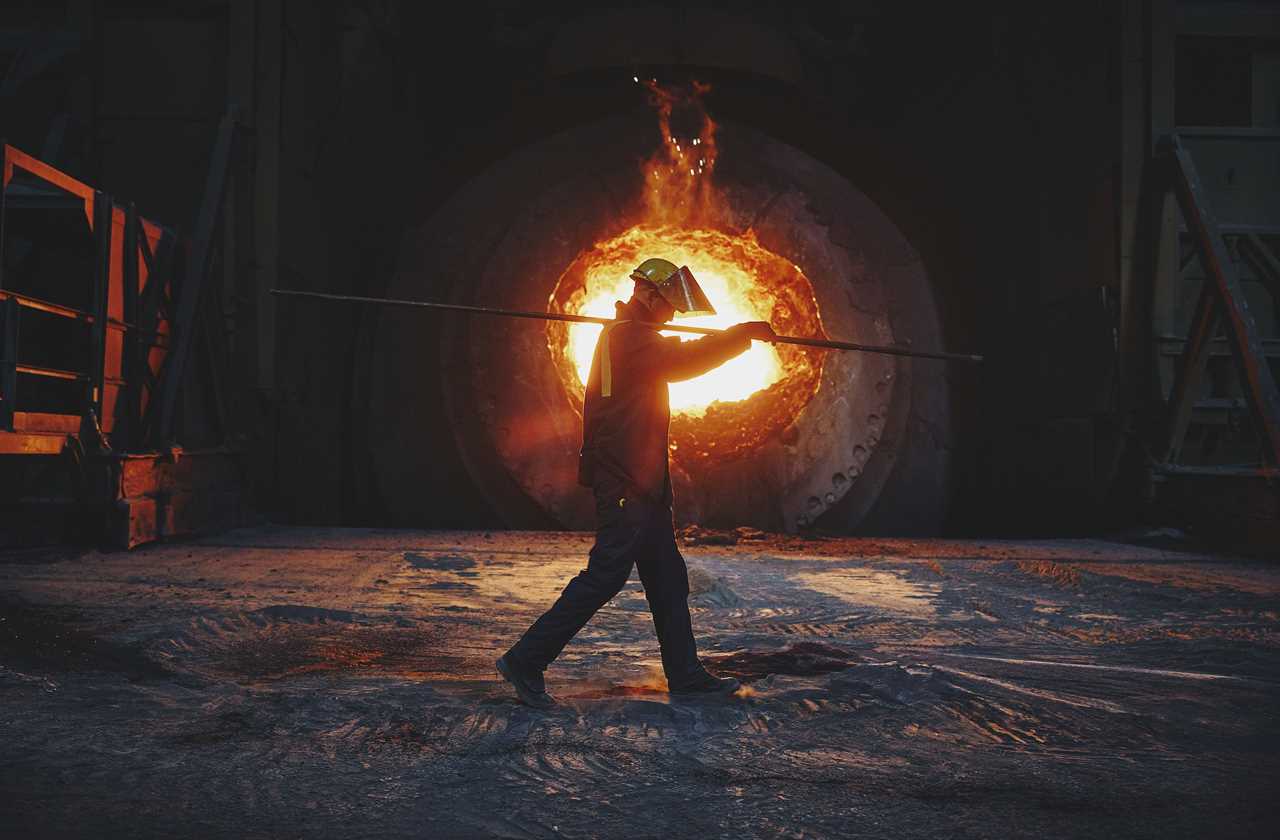
End of an Era for UK Steel Production
The United Kingdom is set to lose its capability to produce steel from the ground up as the final two blast furnaces are scheduled to close. British Steel, now under Chinese ownership by Jingye, announced the shutdown of its Scunthorpe facility, putting 2,700 jobs on the line. The company cited daily losses of approximately £700,000 and unsustainable operations due to adverse market conditions, escalating environmental expenses, and new US steel tariffs.
This closure follows the recent shutdown of Tata Steel’s last blast furnace in Port Talbot, resulting in the loss of 2,500 jobs. The government's infrastructure plans, including the third runway at Heathrow, now face a setback as UK Steel warns of a significant capacity shortfall to meet national demand. Jingye, which rescued British Steel from insolvency in 2020, has proposed converting existing furnaces to electric arc models at a cost of £2 billion. Despite an initial investment of £1.2 billion, the project remains untenable without additional government support. Recent reports indicate Jingye has turned down a £500 million aid package, raising concerns about the future of domestic steel production.
Concerns Over Government Worker Reforms
Lord Wolfson, the incoming CEO of Next, has expressed serious reservations about the government’s proposed worker reforms. He warns that changes to zero-hours contracts under Labour’s Make Work Pay plan could disrupt employment for seasonal workers and students, potentially limiting opportunities for earning extra income ahead of the Christmas season.
Although Next does not currently employ zero-hours contracts, Wolfson emphasized the importance of carefully implementing reforms to avoid unintended consequences. He also called for a gradual increase in National Insurance contributions, noting relief that no new taxes were introduced in the recent Spring Statement. Wolfson highlighted the broader impact of increased burdens on large businesses, suggesting that consumers, workers, and savers could all face adverse effects. Despite these challenges, Next plans to expand its UK store presence and has raised its sales expectations for the upcoming half-year period.

Travelodge Opposes New Visitor Levies
Jo Boydell, CEO of Travelodge, has voiced strong opposition to proposed "tourist taxes" in English cities, arguing that such measures could stifle economic growth. She warned that adopting visitor levies similar to those in Wales and Scotland would complicate operations for businesses and lead to higher costs for consumers.
Travelodge, which operates over 600 hotels across the UK, Ireland, and Spain, reported revenues exceeding £1 billion last year, supported by high-profile events like Taylor Swift’s Eras tour. The company also enjoys robust bookings for upcoming concerts by Oasis, Beyoncé, and Black Sabbath. However, Travelodge is grappling with an additional £21 million in labour costs this year due to increases in National Insurance and the minimum wage.
H&M Faces Slower Sales Amid Discounting Strategy
Global fashion retailer H&M has reported weaker than expected sales growth during its current discounting campaign. The group, which includes brands like & Other Stories and COS, saw a 3% increase in first-quarter sales, reaching £4.2 billion. However, the company anticipates a slowdown this month, projecting only a 1% rise due to extensive discounting efforts.
New CEO Daniel Ervér is pivoting towards celebrity collaborations, signing artists such as FKA Twigs and Tyla, following a successful partnership with Charli XCX last year. These initiatives aim to rejuvenate the brand’s appeal and drive future sales growth despite the current challenges.

Sky Automates Call Centres, Reduces Workforce
Telecommunications giant Sky is set to eliminate 2,000 jobs in its call centres, replacing some positions with automated chatbots. The company plans to close three of its ten UK call centres located in Stockport, Sheffield, and Leeds, with additional impacts expected in Dunfermline and Newcastle.
Owned by the US-based Comcast, Sky emphasizes that these changes are part of its investment in technology to provide a more efficient and responsive customer service experience. The move aims to create a seamless and reliable service available around the clock, aligning with the company’s commitment to enhancing customer interactions through innovation.
Reckitt Executive Bonuses Under Scrutiny
Reckitt, the manufacturer behind brands like Durex and Dettol, faces criticism over its executive compensation packages. Kris Licht, the company’s CEO, stands to receive up to £16.7 million if performance targets are met this year. Last year, Licht was awarded a £5.8 million package, while Finance Chief Shannon Eisenhardt earned £3 million.
This level of remuneration has sparked debate about executive pay scales, especially in times when businesses are navigating economic uncertainties and workforce challenges. Stakeholders are calling for greater transparency and accountability in how top executives are compensated relative to company performance and employee wages.
Businesses Brace for Economic Downturn
The Confederation of British Industry (CBI) has signaled that businesses are preparing for a challenging period over the next three months, with economic activity expected to decline. The latest Growth Indicator shows a negative balance of 18%, driven primarily by the services sector. Manufacturing output is forecasted to remain flat, with worsening projections as per the index.
Key concerns include rising staffing costs, the impact of proposed employment rights legislation, and uncertainty surrounding tariffs. These factors are contributing to a loss of confidence among businesses, which are anticipating reduced investment and cautious operational strategies in the near future.
Frequently Asked Questions
What is the role of central banks in the economy?
Central banks manage a nation's currency, money supply, and interest rates. They implement monetary policy to control inflation, stabilize the currency, and foster economic growth. They also serve as lenders of last resort to the banking system during financial crises.
How can I start saving for retirement?
To start saving for retirement, begin by establishing clear retirement goals and determining how much you need to save. Contribute to employer-sponsored retirement plans, such as a 401(k), and consider opening an Individual Retirement Account (IRA). Regular contributions and taking advantage of compounding interest can significantly boost your retirement savings over time.
What is the difference between saving and investing?
Saving typically involves setting aside money in a secure account for short-term needs or emergencies, while investing involves using money to purchase assets like stocks or real estate with the expectation of generating a return over the long term. Investing carries higher risks but offers the potential for greater rewards.
What is the definition of money?
Money is a medium of exchange that facilitates transactions for goods and services. It serves as a unit of account, a store of value, and a standard of deferred payment, allowing individuals to compare the value of diverse products and services.
What are the risks associated with investing in the stock market?
Investing in the stock market involves several risks, including market volatility, economic downturns, and company-specific factors that can lead to losses. Investors may also face liquidity risk, where they cannot sell an investment quickly without incurring a loss. Diversification and thorough research can help mitigate these risks.
What is a budget deficit?
A budget deficit occurs when a government's expenditures exceed its revenues over a specific period, usually a fiscal year. This can lead to increased borrowing and national debt if not addressed through spending cuts or revenue increases.
What are the different types of money?
The main types of money include commodity money, which is based on physical goods like gold or silver; fiat money, which is government-issued currency not backed by a physical commodity; and digital currency, which exists electronically and is often decentralized, such as cryptocurrencies.
Statistics
- A survey by the American Psychological Association found that 72% of Americans reported feeling stressed about money at some point in the past month.
- According to a survey by the Financial Industry Regulatory Authority (FINRA), about 66% of Americans could not correctly answer four basic financial literacy questions.
- A report by Bankrate indicated that only 29% of Americans have a written financial plan.
- As of 2021, the average student loan debt for recent graduates was approximately $30,000, according to the Federal Reserve.
- According to the Bureau of Labor Statistics, the average American spends about $1,500 per year on coffee.
- According to a Gallup poll, 56% of Americans report that their financial situation is better than it was a year ago.
- A study by the National Endowment for Financial Education found that 60% of Americans do not have a budget.
- The average return on investment for the S&P 500 over the past 90 years is about 10% per annum.
External Links
How To
How To Save for Retirement Effectively
Saving for retirement begins with setting clear goals regarding when you want to retire and how much money you will need. Start by contributing to employer-sponsored retirement plans like a 401(k), especially if your employer offers matching contributions. If self-employed or your employer does not provide a plan, consider opening an Individual Retirement Account (IRA). Aim to save at least 15% of your income annually, including employer contributions. Regularly review and adjust your contributions as your income changes. Diversify your investments within your retirement accounts to reduce risk and maximize potential returns over time.
Did you miss our previous article...
https://hellofaread.com/money/beloved-homeware-store-in-stafford-to-close-its-doors-with-major-sale
 PoliticsRoyaltySoap OperaGamingMoneyPrivacy PolicyTerms And Conditions
PoliticsRoyaltySoap OperaGamingMoneyPrivacy PolicyTerms And Conditions
